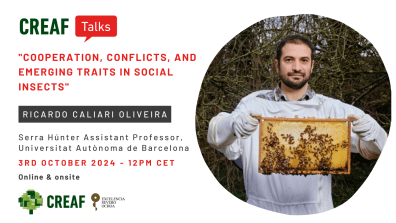CREAF Talk with Ricardo Caliari Oliveira - "Cooperation, Conflicts, and Emerging Traits in Social Insects"
DATE: Thursday, 3rd October 2024.
TIME & FORMAT: form 12 to 1pm CET - In-person and online.
Seminars will combine in-person and online formats (CREAF, Sala Graus II, Universitat Autònoma de Barcelona, Spain) but in all cases, talks will be always streamed (not recorded), so they can be followed online.
HOW TO CONNECT: direct link to the conference.
SUMMARY OF THE WORKSHOP:
Social insect colonies (ants, bees, and wasps) are often perceived as well-functioning societies, with every member acting as a cog in a highly efficient machine. However, this perception is far from accurate. In this talk, I will demystify this concept and demonstrate that, despite the high levels of cooperation observed within these groups, constant conflicts arise between individual and collective best evolutionary interests. Finally, I will explain how self-organization leads to emergent traits in terms of nest architecture that can be passed down through generations in a tropical bee species. The talk will provide a general overview of how cooperation and conflict, along with the inheritance of colony phenotypes, have shaped these remarkable animal societies.
ABOUT THE SPEAKER:
Ricardo Caliari Oliveira is an evolutionary biologist fascinated by the lives of social insects. His career began with studying the ecology of neotropical bees in Brazil, and he has since developed a keen interest in the intricate balance between cooperation and conflict that drives the evolution of sociality. He has held a dual MSc in Evolutionary Biology from the University of Groningen in the Netherlands and LMU Munich in Germany, and he has earned his PhD from KU Leuven in Belgium. In 2022, he was appointed as an assistant professor in entomology and animal behaviour through he Serra Húnter Programme at the Unitat de Zoologia at the Universitat Autònoma de Barcelona, where he founded the B.E.E.S. research group in Behavioural Ecology and Evolution of Social Insects.



